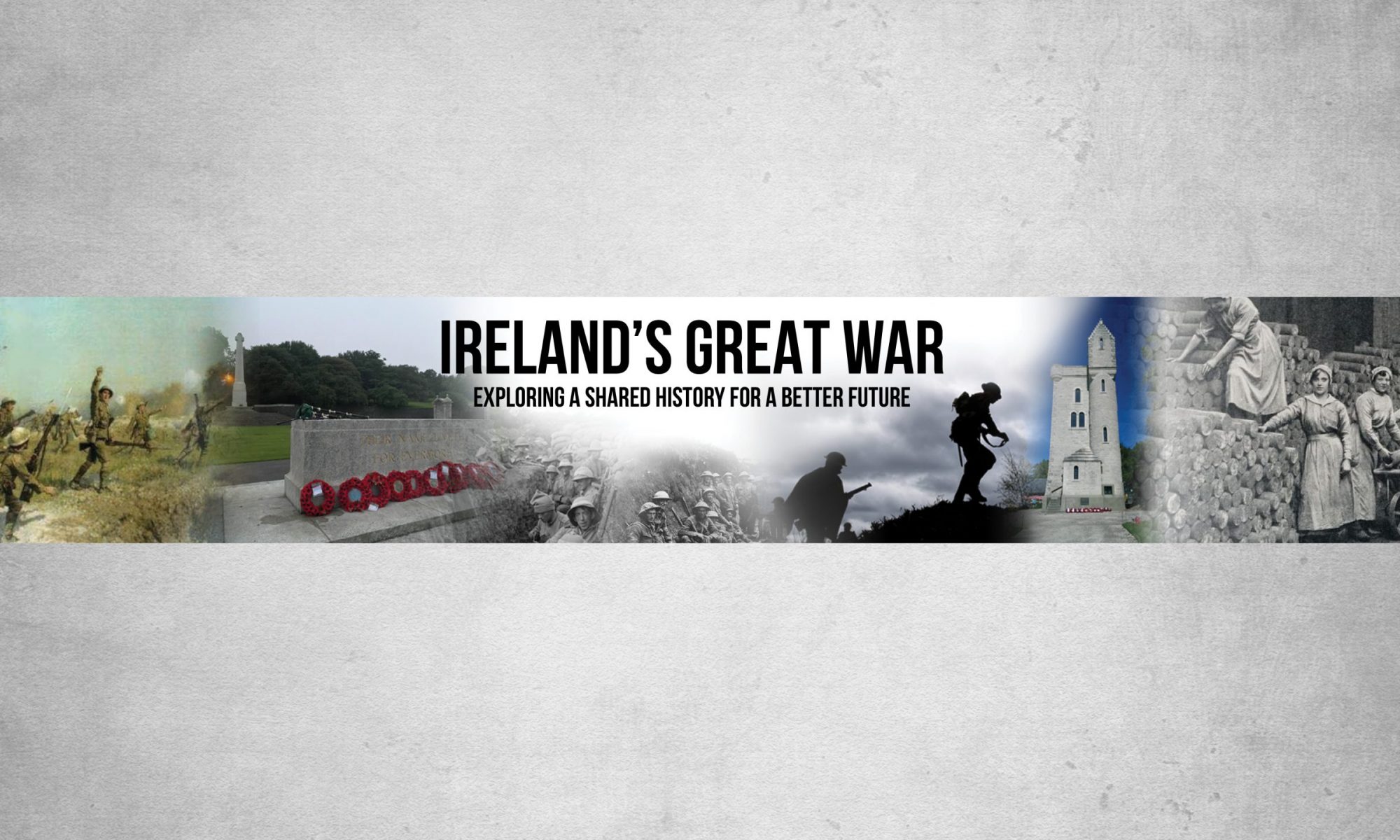Ireland’s Great War
The Great War 1914 – 1918 was one of the most catastrophic conflicts in human history. Every town and village on the island of Ireland were affected. On land, sea and air, at least 200,000 men and women from Ireland served in the war, in theatres stretching from Western Europe to the far reaches of Africa, the Atlantic Ocean to Mesopotamia, and the Dardanelles to Alpine passes. It is a history that has divided communities ever since. However, it is a shared history. It is part of who we are. By better understanding our past we can find common ground for reconciliation in order to create a better future.
From the opening shots of the war Irishmen left their mark; Lieutenant Maurice Dease from Westmeath became the first posthumous recipient of the Victoria Cross in the opening weeks of the war. Previously unheard of places became synonymous with the sacrifice being made; Mons, Ypres, Gallipoli, Jutland, the Somme, Messines. Many served in Irish regiments such as the Dublin Fusiliers, North Irish Horse, or South African Irish Regiment; not forgetting of course The 10th ‘Irish’, 16th ‘Irish’, and 36th ‘Ulster’ Divisions. As they marched to war their bands played Brian Boru’s March and St. Patrick’s Day to cheering crowds.

At least 49,000 Irish lost their lives serving with British forces, how many lost their lives while serving in other militaries around the world is not known. These figures do not include second or third generation Irish of the wider Irish Diaspora. While men from Ireland predominantly served in the British Army, Flying Corps and Navy, emigrants in the Diaspora found themselves in the militaries of their adopted homes; Australia, Canada, France, New Zealand, South Africa, and the United States.
Tipperary born Martin O’Meara is one of the most notable, becoming the only Irish born Australian recipient of the Victoria Cross. Every November in countries around the world regiments such as the Andrew Mlangeni Regiment in South Africa remember their fallen comrades in the Great War and their Irish ancestry; the latter unit was known up until 2019 as the South African Irish Regiment.
The war came to Ireland in more ways than one.At home munitions factories, hospitals, training camps, air stations, and prison camps sprung up around the country bringing the war to the local communities. In many cases it seemed like entire families and villages enlisted. As the war intensified German U-boats sank vessels off the Irish coast; the Lusitania and Leinster with devastating loss of life are just two such examples. To combat the U-boats U.S. Navy air bases were established along the coast.
In many ways the war brought all the communities on the island together. For a time, political and religious differences were forgotten as men fought side by side on the front lines. Behind the scenes, however, there were those who were secretly plotting to use the war to their advantage and rise up with German support.
The story of the Great War in Irish history has divided the island ever since with misconceptions growing around Ireland’s role in it; especially around religion and politics. Exploring our shared history can help bring about a greater understanding of our past and help facilitate reconciliation for a better future.
The Programme
This multimedia programme aims to capture, record, preserve, and tell the story of the Irish contribution in the Great War (1914 – 1918) and the impact that conflict had on the island of Ireland. As each phase develops all aspects of Ireland’s Great War will be explored: culture, Diaspora, economic, education, identity, military. Through multimedia productions: website, film, oral history, podcast, education packs, and articles this programme sets out to tell the personal story of Ireland during the Great War. This programme is a 32 county, transnational programme.

The programme will cover and be presented in five categories:
- History (frontline and homefront)
- Culture and Heritage
- the Diaspora
- Remembrance and Reconciliation
- 5.Education
This programme will:
- Record and preserve story of ireland during the great war
- Provide a platform for educators, researchers, students and members of the public to discover their past
- Add to the existing historiography of Ireland and the Irish diaspora
- Help get the full picture of the Irish service history and preserve its heritage
- Give a voice to those whose stories have yet to be told
- Offer a window into Ireland’s past
- Create a dedicated website, YouTube and TeacherTube channels to host and present the final productions
This programme was established with support from:



